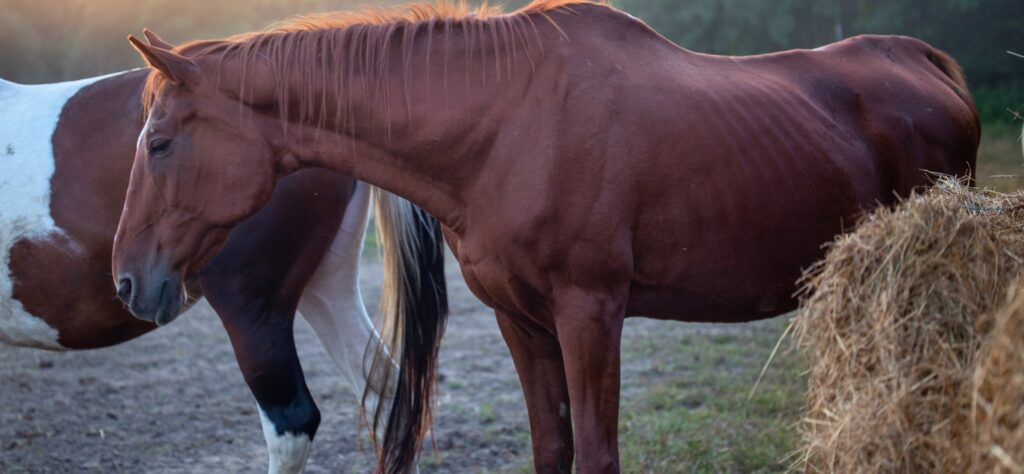Horses, just like humans, can struggle with maintaining a healthy weight. If you find yourself asking, “How can I help my horse gain weight?” you’re not alone. Weight loss in horses can be caused by a variety of factors, including poor nutrition, dental issues, digestive problems, or underlying health conditions. In this article, we will explore some strategies to understand why your horse may be challenged with gaining weight, set weight goals for your horse, and take steps to help them achieve a healthy weight.
Understand Why Your Horse Is Challenged With Gaining Weight
Before jumping into solutions, it’s essential to understand the potential reasons behind your horse’s weight loss or struggles to gain weight. A veterinarian’s evaluation is crucial in ruling out any underlying health conditions that may contribute to weight loss. Common factors that can affect a horse’s ability to gain weight include:
Poor Nutrition:
Inadequate calorie intake or an unbalanced diet can hinder weight gain. Evaluate the quality and quantity of your horse’s diet, including forage and concentrate feeds. Consult with an equine nutritionist for a customized feeding plan tailored to your horse’s specific needs.
When it comes to poor nutrition, it’s important to consider not only the quantity but also the quality of the feed. Horses require a balanced diet that includes essential nutrients such as carbohydrates, proteins, fats, vitamins, and minerals. Without these nutrients, their bodies may struggle to maintain or gain weight.
Additionally, the forage provided to horses plays a crucial role in their overall nutrition. Good quality hay or pasture should be the foundation of their diet, providing them with the necessary fiber and nutrients. It’s important to regularly assess the quality of the forage and make any necessary adjustments to ensure your horse is receiving optimal nutrition.
Dental Issues:
Dental problems such as sharp points, missing teeth, or infections can make it difficult for horses to chew properly, affecting their ability to extract nutrients from food. Regular dental check-ups and floating will help ensure proper dental health and aid in weight gain.
Horses’ teeth continuously grow throughout their lives, and if not properly maintained, dental issues can arise. Sharp points or hooks can develop on their teeth, causing discomfort and difficulty in chewing. This can lead to weight loss as horses struggle to break down their food effectively.
Regular dental check-ups, usually recommended every six to twelve months, are essential to identify and address any dental problems promptly. Floating, a procedure where the sharp edges of the teeth are filed down, can help alleviate discomfort and improve the horse’s ability to chew and digest food properly.
Digestive Problems:
Gastrointestinal issues like ulcers or malabsorption can interfere with nutrient absorption. Consult with your veterinarian to investigate potential digestive disorders and develop a treatment plan if needed.
The digestive system of a horse is complex and delicate. Various factors, such as stress, improper diet, or medication, can disrupt the balance and function of the digestive tract. This can lead to conditions like gastric ulcers or malabsorption, where the horse’s body struggles to absorb nutrients from the food it consumes.
If you suspect your horse may be experiencing digestive problems, it is crucial to consult with your veterinarian. They can perform diagnostic tests, such as gastroscopy, to identify any underlying issues and develop a tailored treatment plan. Treatment may include dietary changes, medication, or management adjustments to support proper digestion and nutrient absorption.
Stress or Anxiety:
Horses experiencing stress or anxiety may lose their appetite and subsequently struggle with weight gain. Identify and address the potential stressors in your horse’s environment, such as herd dynamics, stabling conditions, or training routines.
Horses are sensitive animals that can be greatly affected by their environment and social interactions. Stress or anxiety can lead to a loss of appetite and weight loss in horses. It’s crucial to identify and address any potential stressors in your horse’s life to promote a healthy appetite and weight gain.
Factors that can contribute to stress or anxiety in horses include changes in herd dynamics, inadequate stabling conditions, or demanding training routines. By carefully evaluating and adjusting these aspects, you can create a more relaxed and comfortable environment for your horse, which can positively impact their overall well-being and weight gain.
Set Weight Goals For Your Horse
Once you have identified the potential reasons for your horse’s weight challenges, it’s time to set realistic weight goals. A target weight should take into consideration your horse’s breed, age, and activity level. Working closely with your veterinarian, determine a healthy weight range that is appropriate for your specific horse.
When setting weight goals for your horse, it is important to consider their individual needs and circumstances. Factors such as their current body condition, any underlying health conditions, and their overall lifestyle should all be taken into account. Your veterinarian will be able to provide valuable insights and guidance in this process, helping you make informed decisions.
Remember, weight gain should not be rushed. While it may be tempting to try and quickly increase your horse’s weight, doing so can actually be detrimental to their health. Rapid weight gain can put excessive strain on their joints and organs, leading to potential complications. Slow and steady progress is the key to ensuring your horse’s overall well-being during the weight gain process.
Monitoring your horse’s Body Condition Score (BCS) regularly is essential when working towards weight goals. The BCS is a numerical scale that assesses the amount of fat covering the horse’s body, ranging from 1 (emaciated) to 9 (obese). By regularly evaluating your horse’s BCS, you can track their progress and make necessary adjustments to their feeding regimen.
It’s important to note that weight gain is not just about increasing the quantity of food your horse consumes. The quality of their diet is equally important. A balanced diet that includes the right combination of forage, concentrates, and supplements is crucial for healthy weight gain. Your veterinarian or equine nutritionist can help you formulate a feeding plan that meets your horse’s specific nutritional needs.
In addition to diet, exercise also plays a significant role in weight gain. Regular exercise helps build muscle mass, which contributes to overall weight gain. However, it’s important to tailor the exercise routine to your horse’s individual capabilities and health status. Consult with your veterinarian or an equine fitness professional to develop an exercise plan that is safe and effective for your horse.
It’s essential to address any underlying health issues that may be hindering your horse’s weight gain. Conditions such as dental problems, gastrointestinal disorders, or metabolic imbalances can affect their ability to absorb and utilize nutrients efficiently. Working with your veterinarian to diagnose and treat any underlying health issues will greatly support your horse’s weight gain journey.
Weight gain is a gradual process that requires time and consistent effort, so you’ll want to be patient and persistent. It’s important to regularly reassess your horse’s progress and make adjustments as needed. With proper care, attention, and collaboration with your veterinarian, you can help your horse achieve and maintain a healthy weight.
Take Steps To Help Your Horse Gain Weight
Now that you have a better understanding of the underlying reasons for your horse’s weight challenges and have set realistic weight goals, it’s time to implement strategies to help them gain weight. Here are some steps you can take:
Evaluate and Adjust Diet:
Assess the nutritional content of your horse’s diet and make necessary adjustments. Increase the forage portion of their diet by providing good quality hay or pasture. Forage is the foundation of a horse’s diet and provides essential fiber and nutrients. Consider adding calorie-dense concentrates or supplements under the guidance of an equine nutritionist. These supplements can provide additional energy and nutrients to support weight gain. Dividing the feed into several smaller meals throughout the day can also aid in better digestion and weight gain.
Additionally, it’s important to ensure that your horse has access to clean and fresh water at all times. Hydration is crucial for proper digestion and overall health.
Regular Dental Care:
Schedule regular dental check-ups and floating to ensure your horse’s teeth are in optimal condition. Horses have continuously growing teeth, and if left unchecked, dental issues can arise, such as sharp points or uneven wear. These problems can make it difficult for your horse to chew and extract nutrients from food, leading to weight loss. Regular dental care will help maintain proper dental health, allowing your horse to effectively utilize the nutrients from their diet and promote weight gain.
Manage Stress Levels:
Identify and address any sources of stress or anxiety in your horse’s environment. Horses are sensitive animals, and stress can have a significant impact on their overall well-being, including their appetite and weight. Provide a safe and calm living space, ensuring adequate turnout time in a pasture or paddock. Social interaction with other horses is also essential for their mental and emotional well-being. Additionally, maintaining a consistent training routine can help reduce stress and promote a healthy appetite, leading to weight gain.
Consider Supplemental Feeds:
In consultation with your veterinarian, consider adding weight gain supplements or feeds that are specifically formulated to support healthy weight gain in horses. These products are designed to provide additional calories, proteins, and essential nutrients that may be lacking in your horse’s existing diet. Your veterinarian can help determine the appropriate type and amount of supplement to add to your horse’s diet based on their specific needs and nutritional requirements.
Monitor and Adjust:
Regularly monitor your horse’s weight and body condition score to track their progress. Keep a record of their weight, feed intake, and any changes you make to their diet or management practices. This record will help you identify what strategies are working and allow you to make adjustments as needed to ensure steady and healthy weight gain. It’s important to remember that weight gain should be gradual and steady to avoid any health complications.
Helping your horse gain weight requires a thorough understanding of the factors influencing their weight challenges, setting realistic weight goals, and implementing appropriate strategies. Collaboration with your veterinarian and equine nutritionist is crucial throughout the process. With patience, persistence, and proper care, you can assist your horse in achieving a healthy weight and improve their overall well-being.


